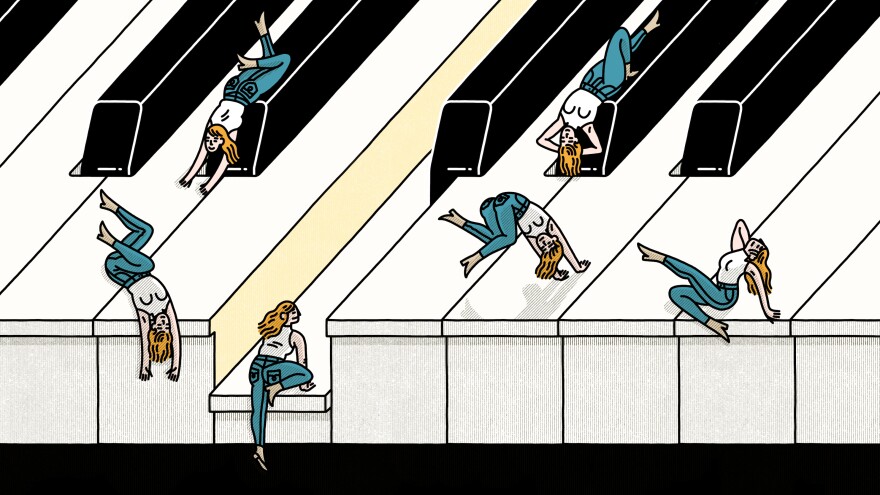To say I'm really into piano feels silly — I might as well say I'm really into speaking English.
That might sound dramatic, but then, I've been playing since I was 3, when my mom first sat me down for a lesson (and I will remember my first song perfectly on my deathbed: C-D-E, E-D-C, D-E-C).
Piano has always made intuitive sense to me. Once I learned how to read the black jumble of dots and lines on the paper, I got it. Any piece became a puzzle to assemble — figure out the keys you're supposed to hit and when you're supposed to hit them. Easy.
But then, after you figure out the puzzle, there are more levels. What happens when you play that piece fast? Quietly? Is this the one you play when you're sad? Bored?
There's also the practical level: Here is the short piece (Chopin – Minute Waltz) for when someone at the party insists that you play that grand piano over there, but you just want to stand in the corner and not draw any attention to yourself. Here is a grand-sounding, romantic piece to impress the boy you're dating (Liszt – Un Sospiro). And so on.
I'm into piano, but the piano is also my frenemy. When I get frustrated enough with something I'm trying to learn, my piano and I stop talking for months on end.
But then, in this relationship, I'm the obsessive, creepy friend. I think about piano anyway — I hear a pop song and my brain leaps to how I would play it, which embellishments to keep, which to emphasize.

Or I go to concerts. Watching a professional pianist perform is something like watching LeBron James or Serena Williams at their best — you sit back and trust that the genius is going to do genius things. It's both comforting and exhilarating.
And each pianist has their own way of doing it. Years ago, I saw a young woman perform a downright athletic version of a Rachmaninoff concerto. It was athletic by necessity — in one of my books, I have a piano piece by Rachmaninoff, across the top of which my high school-era piano teacher scrawled "SHOULDERS" in all caps. Rachmaninoff demands that your body participates. And so it was with this slight woman in her elegant evening gown, rising off the bench over and over to literally put her weight into it.
A few months ago, I saw a different concerto, from an older, slightly rotund pianist, in a full suit. He did not remove his jacket — just sat neatly down to the instrument, as if pulling himself up to a nice dinner.
And then he barreled his way through 40 minutes of some of the hardest piano music ever written. He didn't make it look easy, exactly — because who could? — but he did it with a practiced efficiency, a lifetime of expertise concentrated into one performance.
I find performing terrifying, even nauseating. It took my spouse half a year to get me to play for him when we were dating.
And yet, probably because of a childhood spent playing for countless church services and choirs, I can stomach playing in the background. (But only barely — I had to sit in the car and weep a few minutes of anxiety tears before accompanying my church choir a few weeks ago. The stage fright is real.)
One of my most joyful times in DC was playing at a sing-along piano bar in Georgetown. I had the crappy shift: happy hour, when people mostly just wanted me to pipe down because the Nats were on.
Maybe that's the best kind of hobby to have — one that makes you privately happy, but that you can also use to inject a little joy into the world.
But sometimes, it was great. A petite, barely-out-of-her-teens woman once shyly approached and asked if she could sing. You already can guess how this goes — when she took the mic, this outrageous, huge voice came out. I convinced her to do a few more numbers, and the bar patrons actually turned around to watch — high praise.
Or there was the joy of playing a song everyone knows. A room full of drunk people singing "Say It Ain't So" was fun at the time, but with the hindsight of a two-year pandemic, I now recognize that being in a room of people yelling maskless and off-key that your druuuug is a hearrrrrtbreakerrrrrrr was magical in its own way.
And maybe that's the best kind of hobby to have — one that makes you privately happy, but that you can also use to inject a little joy into the world ... whether via livening up a party, wowing a date, or getting strangers to yell Weezer lyrics.
Danielle Kurtzleben is a political correspondent on NPR's Washington Desk.
Copyright 2022 NPR. To see more, visit https://www.npr.org.





